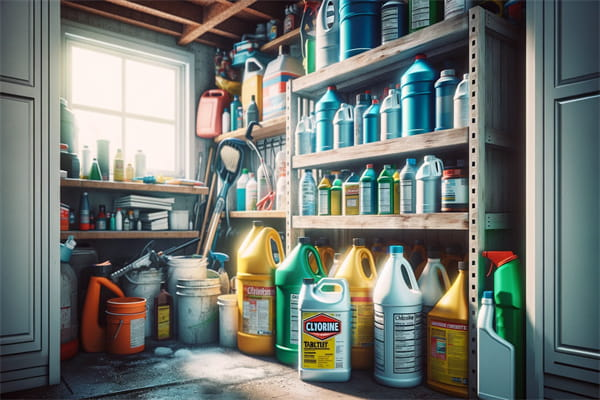When it comes to maintaining a pristine pool, understanding the nuances of chemical storage is not just a nicety—it’s a necessity. Chlorine tablets, essential for keeping your swimming pool free of bacteria and algae, have a typical shelf life of 3-5 years if stored properly. While some forms of these tablets are inherently more stable and last longer than others, all types can benefit from being stored in a cool, dry, and dark environment. Knowing exactly where to store chlorine tablets can not only extend their effectiveness but also ensure safety and cost savings for pool owners and operators.

Ⅰ.Do Chlorine Tablets Expire?
Yes, chlorine tablets can expire. The stability of chlorine is influenced by various factors, including exposure to heat, sunlight, and moisture. Under ideal conditions, chlorine tablets remain potent and safe to use for three to five years. However, improper storage can accelerate their degradation. Signs that your chlorine tablets have expired include a weakened smell (chlorine’s potent scent diminishes over time), crumbling tablets (which indicates they have likely absorbed moisture), and an obvious lack of efficacy when used in the pool.
Ⅱ.Optimal Storage Locations for Chlorine Tablets
When considering where to store chlorine tablets, it’s essential to find a location that meets all the necessary conditions to ensure their effectiveness and safety. Here’s a more detailed breakdown of the optimal storage guidelines:
1. Cool Environment
Temperature Stability: The storage area should remain consistently cool, ideally between 50°F and 70°F (10°C to 21°C). Extreme temperature fluctuations can degrade the chlorine more quickly.
Examples of Suitable Locations: A basement that doesn’t experience dampness or a climate-controlled utility room can be ideal. Avoid areas near heating sources like boilers or radiators.
2. Dry Conditions
Humidity Control: Ensure the area is dry with low humidity levels. High humidity can cause chlorine tablets to absorb moisture from the air, leading to premature activation or degradation.
Moisture Prevention: Use dehumidifiers or silica gel packs in storage areas prone to moisture if necessary. Make sure that the storage area isn’t susceptible to flooding or leaks.
3. Protected from Light
Avoid Sunlight: Direct sunlight can contribute to the breakdown of chlorine tablets. UV light can degrade the chemical bonds within the tablets, reducing their shelf life and effectiveness.
Light-Proof Storage: Use a cabinet or cupboard that doesn’t receive direct sunlight to store chlorine tablets. If the area has windows, consider using opaque or UV-blocking curtains.
4. Safe from Accessibility

Secure Location: Ensure the storage location is not accessible to children or pets. Chlorine tablets are highly toxic and can be dangerous if ingested.
Lockable Storage Options: Consider using a lockable storage cabinet or a room with a lockable door to prevent unauthorized access.
5. Isolation from Other Chemicals
Chemical Separation: Store chlorine tablets away from other household chemicals, especially acids, organic materials, and anything flammable.
Dedicated Space: Allocate a specific shelf or cabinet solely for pool chemicals to avoid accidental chemical reactions.
6. Original Containers
Container Integrity: Always store chlorine tablets in their original packaging or containers. These containers are designed to be chemically resistant and provide an airtight seal to protect the tablets from moisture and contamination.
Labeling and Instructions: Keep all labeling intact, and ensure that storage instructions are easily readable. This helps in maintaining proper storage practices and provides quick access to safety information if needed.
Ⅲ.Common Mistakes in Storing Chlorine Tablets
1. Moisture Exposure
One of the most detrimental errors is exposing chlorine tablets to moisture before use. Chlorine tablets are designed to react with water in your pool, not in the storage container. If they come into contact with moisture due to high humidity or spills, they can be activated prematurely, reducing their lifespan and effectiveness.
2. Storing Near Incompatible Chemicals
Storing chlorine near other chemicals can lead to hazardous situations. For instance, storing chlorine too close to acids can lead to a chemical reaction that releases chlorine gas, and which is toxic and dangerous to inhale.
3. Improper Containers
While it might be tempting to transfer chlorine tablets to another container for what might seem like more convenient or compact storage, this is a significant risk. Different materials might react with chlorine, and containers not specifically designed to store chlorine tablets might not fully seal, allowing moisture or other contaminants to compromise the tablets.
Ⅳ.Conclusion
Proper storage of chlorine tablets is essential for safe and effective pool maintenance. By keeping your tablets in a cool, dry, and dark environment, away from incompatible substances, and in their original containers, you can ensure they perform at their best. This not only helps maintain the quality of your pool water but also ensures the safety of those who enjoy it.

 Instant
Quote
Instant
Quote Email
Us
Email
Us